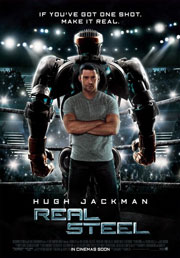
Top stories





Marketing & MediaWarner Bros. was “nice to have” but not at any price, says Netflix
Karabo Ledwaba 1 day

More news

Logistics & Transport
Maersk reroutes sailings around Africa amid Red Sea constraints

















Charlie Kenton (Hugh Jackman) is doing his best to get with the, um, programme. He travels the country as a promoter and sets up fights wherever he can. They're mostly underground bouts that will earn him enough money to keep his many creditors away. Unfortunately, they are just not enough.
To make matters worse, Charlie has to spend the summer with his estranged son (Dakota Goyo). It's while illegally searching for spare parts in a junkyard that the two find an old robot, buried in the scraps. Miraculously, it still works. In fact, it works so well, it just might be their ticket to a better life.
I won't say much more about the plot because Real Steel is as clichéd as they come. Mix one part underdog comeback with one part father/son bonding, sprinkle with too much product placement, cook for two hours on maximum volume, and voilà! - you've got a perfect summer dish for kids with nothing better to do over the school holiday.
Don't get me wrong, parts of Real Steel were actually quite enjoyable. The fights were nicely choreographed. (Sugar Ray Leonard performed some of them via motion capture.) The special effects were also pretty cool. Unlike on the wreck that was Transformers, executive producer Steven Spielberg slows down the action enough for you actually to see what's going on.
Sadly, that's about it. It's hard to feel for characters when you don't know what they're fighting for. You want to believe Charlie is fighting for a second chance at being a boxer, just like he was before it became illegal for humans to do so, but he's portrayed as the kind of jerk who only cares about money. Plus his cockiness gets in the way so many times you stop feeling sorry when his bad decisions unsurprisingly don't work.
The same goes for his son, who ends up being just as cocky. His Bieber dance moves and sassy trash talk are amusing at first, but they soon get old. Every now and then, you can see he's also fighting for a chance at finally having a relationship with his dad. Sadly, like the details of Charlie's love interest (Evangeline Lily from Lost), the connection is treated as nothing more than empty stuffing to fill the time between the fights.
It's also hard to feel for the robots when you stop and realise this is just a giant video game. Do they feel pain? If so, is it fair for us to have them taking punches for us? Some of this is hinted at, but it's never really explored. Maybe we'll find some answers in the sequel, already in production and due out in 2014.
Still, it's interesting to stop and realise what this movie says about our relationship with technology. Much like the movie Surrogates, the people in Real Steel are effectively living through machines. Then again, we already do it all the time. We use email and SMSing as substitutes for human interaction. We spend hours being other people in Second Life and World of Warcraft so we don't have to be ourselves. And let's not forget about epic time-wasters like Angry Birds and Farmville, the perfect way to distract yourself from the boredom of your life. None of that is real.
Then again, what is "real" in the first place? Is living your life through a machine any less real than finding entertainment in actors playing make-believe roles in the movies, on TV, or on a stage? What about listening to music, which is nothing more than vibrating air? Reading words on a page? A painting of a sunset? Are any of these real?
Some might say yes, as all of them have the potential to stir up profound emotions. And the reason they're able to do that is because we can look beyond the surface and see the humanity underneath. You can see the artist's passion breathing life into his work, whatever form that work takes. I guess that's why the movie's last fight (cornier than me inserting a joke about mealies somewhere here) was such a key moment for Charlie's son. He finally saw his dad as a fighter. Yes, it was through an eight-foot avatar, but it was still real.
I guess there's nothing wrong with technology in and of itself. All the advances of modern life have definitely changed things for the better. We just need to be careful things don't go too far, as was clearly the case last year when a South Korean infant starved to death because her parents spent their time at an Internet café, raising a virtual baby instead.
Most importantly, we should never forget that we're real people who need to spend time with other real people. (I long for the simple days of Sega, when you'd actually get together with your friends to play video games in the same room.) Technology can bring us closer together, as it did for Charlie and his son, but take the technology away and you're left with what matters more. That's what Real Steel should have focused on. Maybe then it would have turned into so much more than another robo cop-out.
Rating: 2.5 out of 5
Running Time: 2 hours, 3 minutes
Age Restriction: 13M (V)
